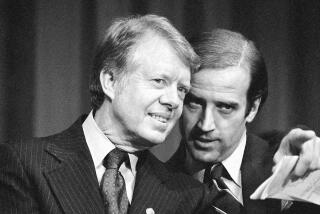Home Alone? No, Foreign Policy Just Won’t Wait : Has Clinton been working hard enough to meet world responsibilities?
- Share via
Ten months into the Clinton Administration and after weeks of delicate haggling, the ever-patient Secretary of State Warren Christopher finally was able to get his boss, the President, to agree to start spending one hour a week-- one hour a week! --conferring with his top foreign policy advisers about the state of the world and America’s role in it. The first meeting of Clinton, Christopher, Defense Secretary Les Aspin and National Security Adviser Anthony Lake was on Nov. 12. So was the last one.
A DUAL RESPONSIBILITY: Since then, says an Administration official, Clinton has been too “busy with other things” to sit down for an hour to ponder global affairs with his advisers. Certainly there has been a lot on his agenda, including rounding up congressional support for the North American Free Trade Agreement, meeting with Asian and Pacific leaders in Seattle, dealing with the day-to-day details--and Clinton does love to immerse himself in details--of domestic policy. All this was of course necessary. But the fact remains that the world has stubbornly refused to stand still since last Jan. 20, or since Nov. 12. The President, by law and precedent, is in charge of shaping the nation’s foreign policy and conducting its foreign relations. There is a worrisome and frustrating sense in Washington and in other capitals that Clinton hasn’t been working hard enough to meet this compelling responsibility.
Clinton’s ability to involve himself deeply in such important international issues as NAFTA is a plus. At the same time his inability or disinclination to focus on the broader aspects of foreign policy, to spend necessary time listening to debate among his advisers and to share his own thoughts with them, has denied his hard-working officials, from those at the Cabinet level on down, the guidance they need to formulate the nuts and bolts of policy. The result too often has been a series of avoidable and sometimes embarrassing missteps--false starts in Bosnia and Haiti, uncertainties about how to deal with the potential nuclear threat from North Korea, confusion about what the American mission in Somalia is supposed to be.
Almost every new Administration, and especially one led by a President who arrived in Washington as an outsider, goes through a sometimes extensive and often painful learning process. The Clinton Administration, as it heads toward completion of its first year, has not made any irrecoverable foreign policy mistakes. But international leadership begins with vision at the top, with a clear sense of what the United States wants to do and has the resources to do in the world. However much it may go against the instincts of his White House political advisers, who feel that electoral points are best scored by concentrating on a domestic agenda, Clinton has to start paying greater attention to both immediate and potential foreign policy challenges. He must focus as intensely on those global issues that affect the national interest as he has focused on, say, health care reform or trying to control the federal deficit.
What this Administration must yet develop is a surer sense of how all the pieces of the global mosaic fit together. The Administration is right to say it has not done badly on such big issues as dealing with Russia and encouraging Middle East peace talks. But it’s also true that the positions taken in these areas so far have been largely inherited and reactive--supporting Boris N. Yeltsin’s reforms and his struggle against those who tried to overthrow him; blessing the breakthrough achieved secretly and bilaterally by Israel and the Palestine Liberation Organization.
A COMMAND OF RESPECT: On other issues decisions too often have appeared to be spontaneous and unformed, with little thought given to how action or inaction in one place can affect policy in another. When, for example, a handful of thugs on the docks of Port-au-Prince are able to prevent a shipload of armed U.S. soldiers from landing in Haiti, it does not go unnoticed in Pyongyang. What North Korea decides to do about defying or cooperating with international nuclear inspections is going to be influenced by how it assesses U.S. resolve.
Every Administration deserves time to find its way in the world. But when all is said and done it remains up to the President to chart the course. A President who can’t find the time to work with his top advisers--even his secretary of state--to devise a strategic concept is not going to be an effective navigator. The solution is simple: He must make the time.
More to Read
Get the L.A. Times Politics newsletter
Deeply reported insights into legislation, politics and policy from Sacramento, Washington and beyond. In your inbox twice per week.
You may occasionally receive promotional content from the Los Angeles Times.







